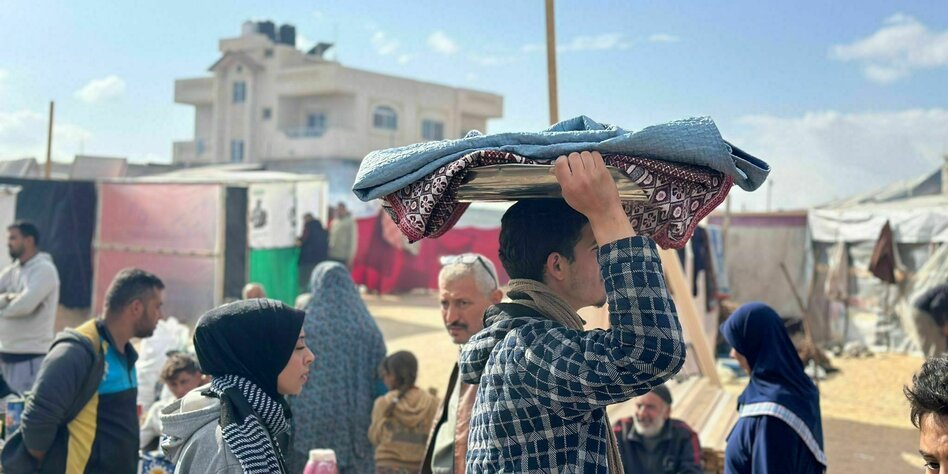
The border town of Rafah, on the southern border, is considered one of the last refuges for the people of Gaza. Four refugees talk about their life there.
Around 1.3 million people now live in makeshift tent cities in Rafah. In a city that before the war had just under 300,000 inhabitants. Even before Israel threatened to invade Rafah, the situation was almost unbearable, as four people from Gaza described it to Palestinian-born journalist Sami Ziara. Here are the records of him:
Jabalia's Mahmoud Ahboul: Everything is twice as expensive
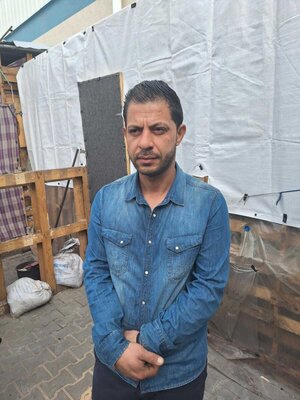
I've been here for more than sixty days. Our life before October 7 was good, now it is hell, it cannot be compared. I'm an engineer, I went to work, I had a life.
Now I have to get up very early to look for bread and prepare something for the children to eat. I stay in a school room with my family. Each room can accommodate about three families, each with about six people.
When we fled, we only had the clothes we were wearing. We try to buy new clothes here, but everything is very expensive: everything costs at least double. Everything in Rafah is expensive, my salary already ran out on the 15th of the month.
Even going to the bathroom is a struggle. We queue for hours. The same thing happens when we want to take a shower. I have three children, one is in 1st grade and the other is in 6th grade. We sent them both to fetch water so that we can at least drink clean water.
I am forty years old and I want to tell the world: we want the war to end. We are resilient, but we have no control over the things that are happening right now. We pray that the situation improves.
If the way was clear to return home and live in a tent, I would do it, even though our house might have been destroyed. There life was more comfortable, we had water, food, everything was cheaper.
I'm not the only one here in Rafah who thinks this way, everyone here feels the same. We all want the war to end. We can't do it anymore. We want the world to help us rebuild our homes so we can return home.
Hatem Medhat Ghoul of Gaza City: Every day is a nightmare
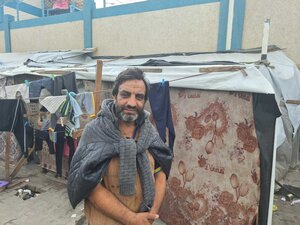
I fled from Gaza City to Rimal, Khan Younis and Rafah. I don't know anything about my house, but I know that everything around it is destroyed. None of the old houses are still standing. In my family we are a total of seventy people, including me, my wife and our five daughters. I've been on the run for 80 days.
Before October 7th I was middle class, I could buy everything for my family. Now that doesn't work anymore.
For example, I want to buy diapers and I can't afford them. Here we have to fight for everything: water, food, even a piece of bread. We are not used to having to fight for essential things.
We have to wait to go to the bathroom, wait for our paycheck and everything is too expensive. Prices are completely manipulated and no one controls how much money merchants offer their products for. Prices are not even reviewed, not even those of essential products such as milk.
We lost a lot of people in my family: my sister and her children, my uncle, about 100 people in total. They are innocent people who sleep in their houses when they were destroyed.
The environment here makes us very sick: we have allergies from water, our body is dehydrated from malnutrition. We're lucky right now because it's not so cold anymore. If we have blankets we give them to the children, and we adults wear two pairs of pants and try to keep warm with our clothes.
I ask those outside: look at us with eyes of mercy. We don't deserve to die. We want to stay in Gaza and not emigrate, and now we are paying the price for it. We are the only people in the entire Arab world who have to pay this price.
For us Palestinians, this is the second or even third time we have been forced to do this: the first time during the Nakba, when we stayed and fought for our country. If we could go back home, we would, even if our house was destroyed.
Here we cannot live with other people, it is a narrow space with bad conditions: this is the second war against us. We dream every day of our misery: Will we find bread? Can we find wood? Can we find food?
We think about the weather, the room we live in and the lines we have to stand in. We dream this nightmare every day. We want it to end.
Abdel Majid from Gaza City: Getting water is difficult
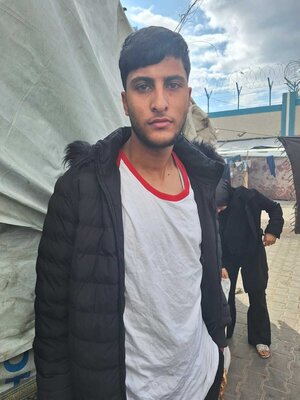
I have been living in Rafah for more than two months. My life before, in Gaza City, was much better than here. The situation in Rafah is difficult. What is needed for a normal life is not available here: food and water, for example.
My day starts at six in the morning, I look for food, I light a fire to warm myself and my family. There is no gas and hardly any wood, it takes forever to light the fire. Finding water is also difficult. It takes almost eight hours to fill a gallon, and this has been happening for weeks.
Prices have also skyrocketed. We paid five to seven times more for the same things we bought before the war. Children are the ones who suffer the most. We can't buy them what they want because prices have at least doubled.
And then the time came: my tent was destroyed by the rain and the wind; It was simply blown away by the wind because it could not be properly anchored to the ground. When we leave the house, we only take t-shirts. I recently wanted to buy a jacket. It used to cost 40 shekels (about 10 euros), now it costs 150 (about 38 euros). I wish the world would support us, be by our side and recognize our situation and its tragedy. I'm tired of war, of the difficulties of living here: enough is enough! I thank all countries working to end the war.
Shadia, Hajja Um Mohammad, from Beit Lahiya: 25 people in one room
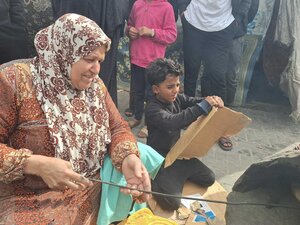
I always wake up early in the morning because of the children's voices. I have two twins, they are three months old. I also have three grandchildren from my son, the youngest is four months old and the others are one and a half and two years old. My daughter also has three children. We all live together in one room: 25 people in total!
It's cold, there's no electricity and there aren't enough blankets. The children cry from the cold. They want hot water, but we have to heat it on the fire, and that is almost impossible because there is very little firewood. We now use nylon instead of wood, although the fumes make us sick.
When children wake up, they want to eat, but most of the time it is difficult for them to even find bread. The lack of food, the time, the scarce water: we pray to God to help us and allow us to return to our homes. In Beit Lahiya he had running water and a warm home. I can barely speak now because of the smell of burning nylon.
There is no safe place here. Every day I wake up and pray to God to protect us, keep the Jews away from us, and return home safely to the children. I have twins, they were born a few days after our arrival in Rafah.
Our environment here is very dirty, everything is dirty here: the food, the streets, the bathrooms. If we find water we buy it, if not we drink dirty water. We are so thirsty that we have to drink it.
Water drips on us from the ceiling of our room. I'm baking bread right now, otherwise I would show you the terrible conditions we live in.
The twins I've had now were planned for seven years. They are still very small due to malnutrition. Milk is contaminated with germs due to dirty environment. We are starving because we receive very little food and we give what we have to the children.
All our clothes were destroyed when our house was destroyed. We bought new ones but they gave us a rash. Life here is so expensive that sellers shamelessly exploit our situation.
I hope things get better soon. I just want peace and for God to put an end to this war soon.
We have some martyrs in the family: my uncle's children died. In our dreams we could not have imagined this destruction: what is happening on our land and in our homes. How can we ever go back?